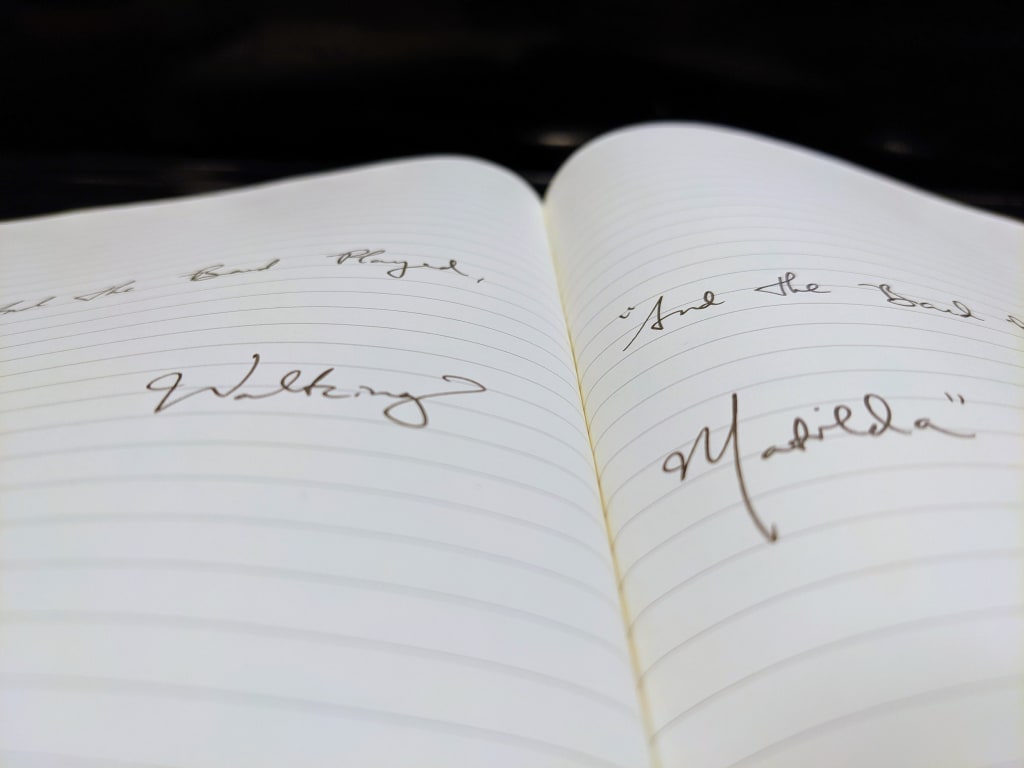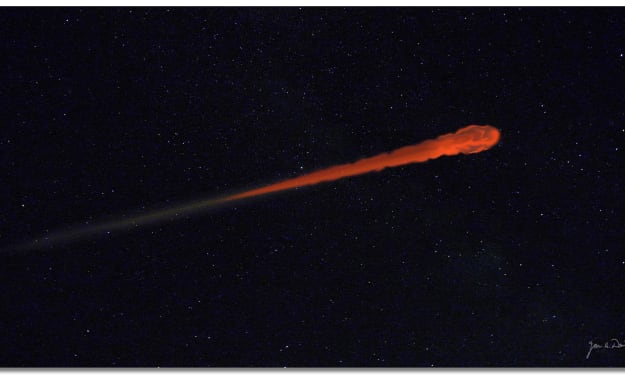And the Band Played "And the Band Played Waltzing Matilda"
A Brief Evaluation of Value

In another life, Optenant Thirteen could have been an Irish rover. Made by those only somewhat more sophisticated than herself, there was within her something of the perpetually lost and the always wandering, a curiosity beyond her years that belied the expected and even expecting patterns of her code. Therefore, perhaps unlike later models, when her sensors detected a subject in motion, regardless of its mass or its velocity, instead of jerkily halting and starting—back-and-forth, back-and-forth, always back-and-forth—she would immediately begin moving toward it, increasing her own speed to the extent that she was capable. This was, unfortunately for her but nonetheless rather good for the thing she was pursuing, not by much. She could’ve been an Irish rover because her body—her chassis and operating system, each transistor, everything that contained and was contained—was often in the cities, the decrepit metropoli as they currently were, but her soul, incalculable and transcendent, was always living and reliving the impossible past.
The sky overhead was a kind of pigment red, as it had been for many years, sunlight trickling through the ozone, the dunes collaborating, albeit innocuously at first, to bury the remnants of a world long abandoned by those who’d once endeavored to construct it. Optenant had traveled far from the factory of her birth, learning out of necessity to perform impromptu maintenance on herself, along the way, but she had always understood, even from the beginning, that geography and time could separate one civilization from another, such that on the surface their differences seemed astronomical, but that eventually each one, whether apparent or not, was susceptible to the unyielding law of entropy—including herself, and perhaps most tellingly, those who had so arrogantly made her.
She noticed the edge of the silver suitcase, then, despite that eighty percent of its mass had been buried beneath the sand, almost immediately. Visibility was low—a fact elicited by the suggestion of a coming sandstorm, by the sun overhead, as it were, partially stifled by cloud-cover—but her tools of perception, although they had not evolved much beyond the intentions of her creators, far surpassed their own. Optenant had been made, made in fact by those who had themselves been made—for tasks “far more important,” they might have said—to notice adjustments, however infinitesimal, to her immediate environment. It followed, then, that as a piece of technology, she represented a functional improvement. Through her own specificity, i.e., the narrowness of her task, she was better than those who had made her; and yet, because she had been made, she was by definition inferior.
The suitcase, its corner a shimmering triangle in the desert, drew her in, the dimples in its frame reflecting idiosyncratically the light that touched them. She moved slowly, the tread of her wheels similar to a tank’s bogies—chosen naturally for their mobility on various types of terrain—but not without an almost human sense of purpose. It would be impossible to observe her behavior, as humans had been known to do with one another, and draw accurate conclusions about her feelings. It would not be incorrect, however, to say that the clear existence of an object of desire (here, the suitcase) indicated also the clear existence of desire itself— however the term needed to be defined before it could make sense.
She crested the top of the dune, placing the object within the minimum radius for proper analysis. A small, retractable arm reached out and touched it. You wouldn’t have known it from looking, but Optenant Thirteen was thinking: that is, she was calculating the thing’s history.
--
—whose individual components were independently manufactured in March 1967, January 1965, April 1968, and October 1970 respectively, the liner having taken the most time, in separate factories, each located on the Eastern Seaboard of the United States. The parts were assembled into the final product, serial number WS-H84555Z, at the end of 1971 by an assembly line of human workers, paid no more than three US dollars per hour, whose principle task was highly machine-assisted, even though—
—purchased directly from the manufacturer by Williams’ Gentlemanly Goods, a successful retailer of upscale men’s clothing and accessories, whose stock included ties, dress shoes, socks, slacks, and, for the particularly wealthy customer, custom-tailored suits, in early 1972. The surface of the suitcase would be scratched in transit on account of improper handling. Williams’ would promptly send the item back to the manufacturer for—
—employee, disgruntled by being passed up for a promotion in the fall of 1966, the winter of 1967, and again in the spring of 1970, would take the slightly damaged suitcase, valued, without the blemish, at a pre-market price of forty US dollars. This minor act of defiance would go unnoticed, well after the employee in question resold the suitcase at a significant markup, until March 23, 1975, for which she was—
—the closet of the first owner, where it would remain for the next five years, collecting dust at a rate of one square centimeter per three hundred sixty-seven-point-five seconds of earth time—
—whose home was burgled in the winter of 1978 by an aspiring professional criminal called Bé. Had Bé thought to check the suitcase’s contents, he would have noticed that it was empty, a fact that greatly perturbed the boss that had hired him only three months earlier. The suitcase was kept; Bé was—
—a few jobs, mostly as a part of a disguise, meant to give the individual an air of professionalism—
—was shot at in 1981, two bullets having penetrated the exterior of the case and a third grazing the handle—
—given as a gift by the boss to the boss’s brother, who had never, for some reason, even questioned the complex history that the object’s physical appearance suggested, although he would bring it to a luggage repair place in the June of 1981, only to forget—
—kept for four years by the luggage repair person and displayed, along with a before-and-after photo, as an indicator of her skill until—
—by state law enforcement in 1986 to be used for undercover work—
—filled with twenty thousand US dollars in discretely marked bills, along with a little black book, masquerading as a ledger, containing a tracking device made to resemble a thin sheet of college-ruled notebook paper—
—brought by two plainclothes policemen, whose true identities were not yet known to those present, to the area beneath the I-601 onramp in 1989 at five thirty-two (pm) and something like forty-nine seconds, fifty seconds, fifty-one—
—left in the rain in the wake of the altercation, never retrieved by its owners, despite the estimated combined value of the suitcase, the cash, and the tracking device (about thirty thousand and fifty-three US dollars)—
—found by a homeless drifter in 1995 who was unable to open it and who carelessly discarded it in a nearby reservoir, where it would remain until the reservoir dried up, thousands and thousands and thousands of—
—covered and covered, over time, by bits and bits and bits of sand, nothing visible except for one of its—
—discovered by Optenant Thirteen, product line 33333-3, innumerable human years after humanity had simply lost the ability, which it had always considered so valuable, to keep count.
--
Soon she was pulling it by its handle out of the sand—slowly, always so slowly—and dragging it down to a surface that was mostly level. She would not bother to use the combination lock, the code to which she could access without difficulty, simply because to do so would allow the suitcase eventually to be re-shut. Containment, more than antithetical to her programming, was ideologically, i.e., vis-à-vis her own, unpalatable.
Everything had to be opened, and once it had been, perhaps even more important than the opening itself, it was to always remain that way. The contents of the suitcase were therefore almost violently excavated. She sliced across the clasps with light as sharp as blades, tipping the case’s body from beneath, which made it topple over—the weathered bills within flapping away in the desert wind like birds once imprisoned but finally set free.
Optenant Thirteen, who might have believed herself to hobble had she known the word, picked up the black book—deemed “culturally or scientifically significant” by a prior culture significant enough to know what this meant—and rolled on, probably going west but who could ever be sure, feeling the overwhelming urge to whistle as she went.
About the Creator
Bradley William Holder
"Hold my beard." —Socrates






Comments
There are no comments for this story
Be the first to respond and start the conversation.